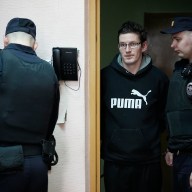By Joern Poltz
MUNICH (Reuters) – Two former Yugoslav intelligence chiefs were jailed for life by a German court on Wednesday for masterminding the murder of a Yugoslav dissident in the southern German state of Bavaria more than three decades ago. The court in Munich found Croats Josip Perkovic, 71, and Zdravko Mustac, 74, who were top officials in the communist-era Yugoslav secret service, guilty of complicity in the murder of Stjepan Durekovic, also a Croat. Durekovic was found dead of gunshot wounds and head injuries in a garage in the town of Wolfratshausen in 1983.
The crime went back three decades to the period before the break-up of Yugoslavia in war in the early 1990s leading to the emergence of seven independent Balkan states.
“The prime motive was to kill a regime critic, a separatist,” presiding judge Manfred Dauster told the higher regional court in Munich. “Durekovic was to be muzzled – politically, but also physically.” Croatia extradited Perkovic and Mustac in 2014, under pressure from Germany.
Defense lawyers plan go to Germany’s federal high court to appeal Wednesday’s ruling in Munich. If the sentences are upheld, Perkovic and Mustac will be able to apply to serve them in Croatia. Another man, the owner of the garage who had managed to win Durekovic’s confidence, was sentenced to life imprisonment in Germany in 2008 for his part in the murder. At the time, the court established that 22 Croats were murdered in West Germany, at the behest of the Yugoslav leadership. Croatia initially refused to comply with Germany’s extradition requests for the two men, triggering a diplomatic dispute in 2013 that threatened to overshadow the state’s accession to the European Union. Shortly before joining the EU on July 1 2013, in a move that irked its EU partners, Zagreb changed its laws to prevent the extradition of suspects in crimes committed before 2002, when new EU extradition rules took effect. The Zagreb government said at the time that it wanted to protect veterans of Croatia’s 1991-95 independence war from facing potential prosecution elsewhere in the EU. It denied any connection with the Perkovic case and pointed out that some EU member states had the same 2002 time limit. The government later removed the time restriction after the European Commission warned it could face legal action, including possible loss of EU development funds.
Perkovic helped set up Croatia’s national intelligence agency as it seceded from Belgrade in 1991, when Yugoslavia broke up in bloodshed, and held senior security posts through the 1990s.
(Reporting by Joern Poltz; Writing by Paul Carrel; Editing by Richard Balmforth)


















